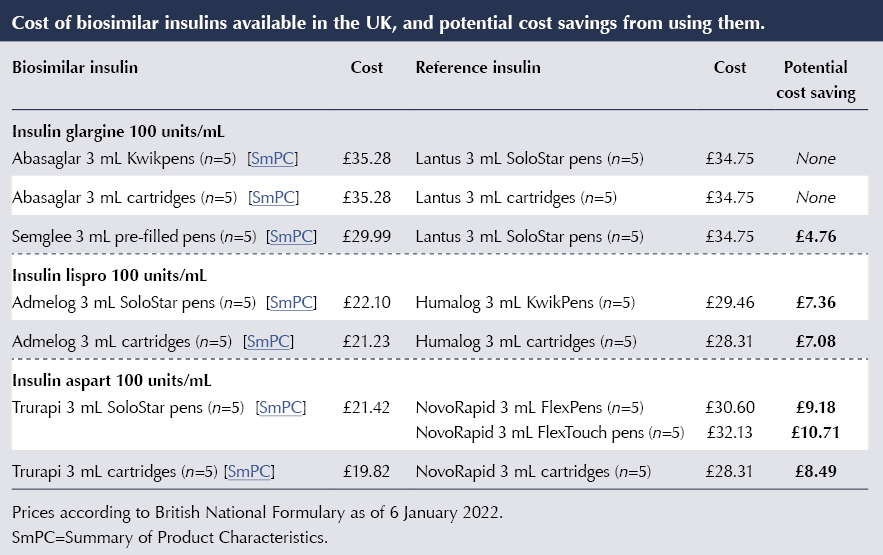
Initiating in insulin-naïve individuals
Consider a biosimilar as the first choice, following recommendations of the local Area Prescribing Committee.
Switching to a biosimilar insulin
The decision to switch an insulin to its biosimilar version must be undertaken by a clinician with a special interest in diabetes, experienced and competent in prescribing insulins, in conjunction with the individual concerned, and never substituted at the point of dispensing.
The Association of British Clinical Diabetologists (Jayagopal et al, 2018) and Diabetes UK (2019) advise against switching in individuals with stable glycaemic control. However, in contrast, the NHS commissioning framework for biosimilars (NHS England, 2017) recommends their use in this group.
- If the person was previously achieving optimal glycaemic control, it is prudent to start the biosimilar at a 10% lower dose than the originator insulin and then titrate back up to the original dose as necessary.
For those individuals with poor glycaemic control, a switch to a biosimilar is reasonable, in addition to tackling the underlying reasons for the poor control.
- Where there have been persistently low glucose levels or below-target HbA1c, it is appropriate to reduce the starting dose of the biosimilar by 20%.
- If glucose levels have been running high or HbA1c is above target, the biosimilar should be initiated at the same dose as the originator insulin and uptitrated subsequently as necessary.
Safety aspects to consider
Prescribing insulins by brand name is important to avoid inadvertent substitution in the dispensing process.
Individuals who switch to a biosimilar insulin must be fully informed and receive appropriate education. Consider potential differences between the insulins in terms of:
- Delivery device (whether based on cartridges or reusable pens) and administration.
- Storage conditions and shelf life (check Summaries of Product Characteristics).
Encourage individuals who switch to monitor their glucose readings more closely to identify any variability in glucose profile compared to the reference insulin.
Biosimilar medicines, including insulins, have been accorded a black triangle status in their early years of use. Healthcare professionals should report any issues or adverse effects to the MHRA using the Yellow Card system.
Recommended reading
Down S, Beba H, Brown P et al (2019) Guideline for the managed introduction of biosimilar basal insulin. Guidelines. MGP Ltd., Chesham. Available at: https://bit.ly/3n3Q2yS (accessed 04.01.22)






Quick links to the best resources, publications and research for all nurses with an interest in diabetes.
20 Jun 2025